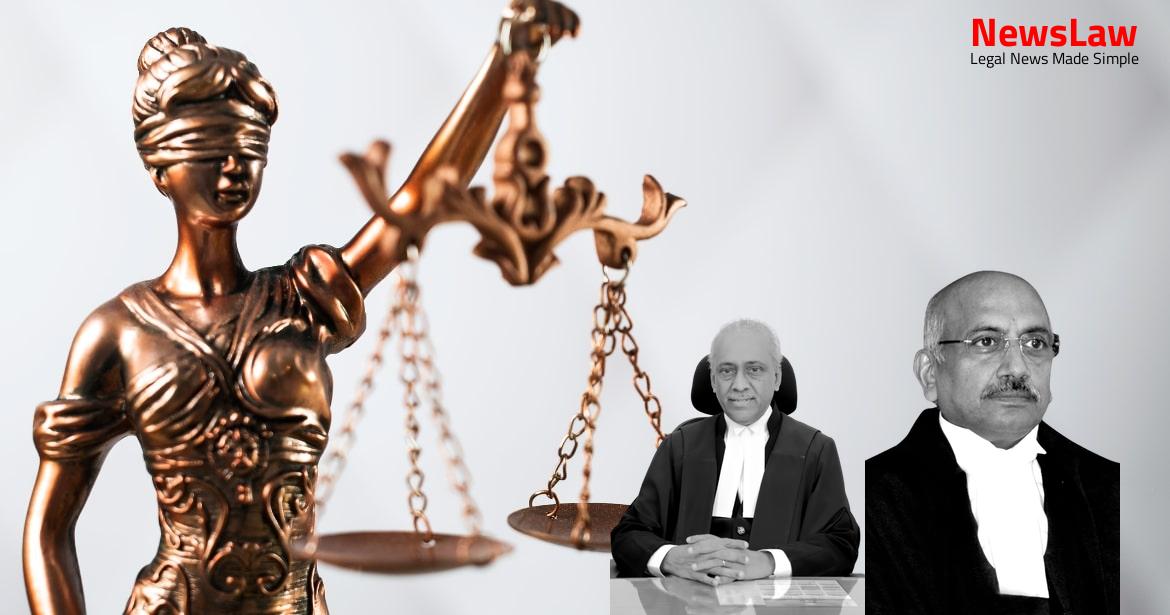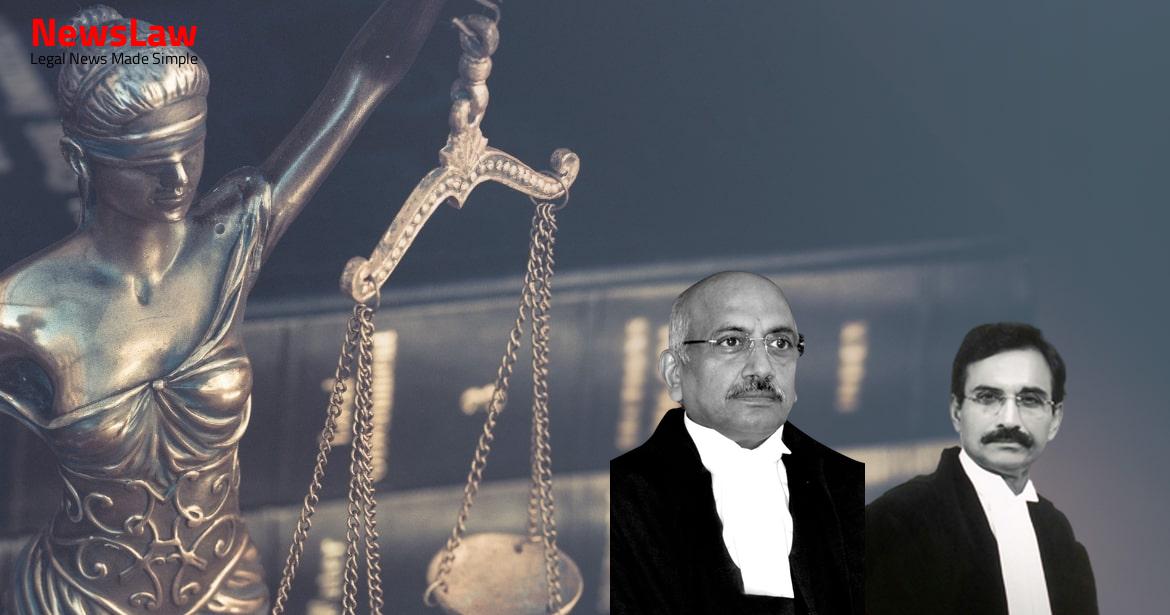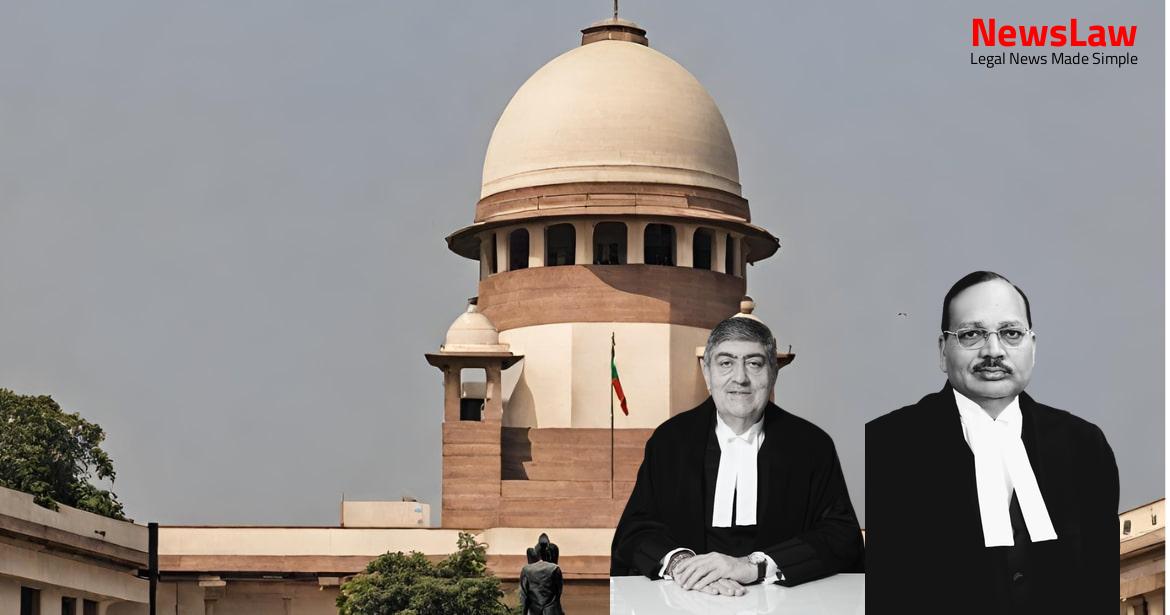Delve into a recent court judgment that delves into the legal intricacies surrounding tenant rights and demolition orders. The court’s analysis focuses on the distinct provisions of Rent Control laws and municipal legislation, shedding light on the applicable procedures and protections for statutory tenants. Stay tuned to unravel the complexities of this crucial legal issue.
Facts
- The Division Bench of the High Court found lack of bonafides in issuing notice under Section 322 of the Act, deeming the order not legal and valid.
- The High Court dismissed the appeals in favor of the plaintiff but allowed the appeal arising from the first suit filed by the plaintiff, granting quantified damages and ordering a monthly payment of Rs. 10,000 until possession is handed over.
- The High Court ruled that the building in question was unlawfully demolished in haste, entitling the plaintiff to possession as he was unlawfully dispossessed.
- The Court interpreted Section 108(B)(e) of the TP Act, stating that the statute did not confer the right for determination on the lessor, making it impermissible to introduce additional grounds.
- The trial court noted the loss of earnings amounting to Rs. 10,000 per month based on evidence, leading to the dismissal of both the appeal and the second appeal.
- The plaintiff filed a first suit on 27.1.1995 for permanent injunction after the building was demolished on 9.1.1995.
- The High Court directed the Corporation to pass a final order in four weeks, which was done on 5.1.1995.
- The plaintiff claimed statutory protection under the Karnataka Rent Control Act, 1961.
- An application by the plaintiff for violation of an interim order dated 15.2.1995 was dismissed on 10.8.1998.
- The tenant sought to reconstruct the walls of the godown.
- A second suit for damages was filed on 30.10.1995, even though the right to claim damages existed during the first suit.
- The Court Commissioner reported cracks and water leakage in the building.
- The appellant challenged the demolition order, stating it was in poor condition and a danger to the public.
- The High Court dismissed a writ petition against the show cause notice on 8.12.1994.
- Notice under Section 322 of the Karnataka Municipal Corporations Act was issued due to the building’s dilapidated condition.
Also Read: Interpretation of Will and Hindu Succession Act: Legal Analysis
Arguments
- High Court found that the loss of the premises and business was a result of high handedness of officials and the appellant.
- Order of demolition was served on the deceased plaintiff on 6.1.1995 at 5:20 pm, with the building being demolished on 9.1.1995 at 9:00 am.
- Argument made that the plaintiff did not receive a clear three days’ notice to vacate the premises or seek legal remedy.
- Claimed that execution of the order under Section 322 of the Act required a prior order under Section 462 of the Act.
Also Read: Land Compensation Redetermination Case
Analysis
- Section 322 of the Act is quoted.
- Section 462 of the Act is quoted.
- Section 322 of the Act allows the Commissioner to order immediate evacuation of property, with police enforcement.
- The High Court’s finding on lack of clear three days’ notice for demolition is partially correct.
- The High Court gave four weeks for the Corporation to pass a speaking order after a hearing.
- The Act and Rent Act serve different purposes and have separate spheres of operation.
- Order II Rule 2 CPC dictates that a suit should include all claims related to the cause of action.
- The High Court’s assertion that the Rent Act prevails over the Act is disputed.
- The High Court erred in stating that the cause of action for the two suits was different.
- The Act focuses on broader municipal functions for resident welfare, contrasting the Rent Act which deals with landlord-tenant issues.
- The judgment did not address the rights of a statutory tenant under specific statutes.
- The plaintiff was conscious of seeking damages but required court leave for subsequent suits.
- The demolition in question did not necessitate a time frame for compliance due to safety concerns.
- The argument that as a statutory tenant, rights are only under Rent Laws was not raised or considered.
- The tenant’s rights were claimed to extend beyond building to the land, seeking equivalent space in a new building.
- An argument invoking Section 462 of the Act regarding notice execution was raised and subsequently refuted.
- In various judgments, the Court examined different aspects related to tenancy rights and eviction under the TP Act and Rent Control legislation.
- The Court clarified that statutory tenants have protections under Rent Control laws, and the procedures prescribed under the TP Act may not be applicable to them.
- Judgments like Allahabad Bank v. Canara Bank & Anr highlighted the distinction between special and general statutes in relation to tenant rights.
- The Court emphasized the importance of statutory tenants availing remedies under Rent Acts rather than the TP Act for properties situated in urban areas.
- In cases like T. Lakshmipathi & Ors. v. P. Nithyananda Reddy & Ors., the Court reaffirmed the rights of landlords to seek eviction on valid grounds under the Rent Control legislation.
- A Seven Judge Bench in V. Dhanpal Chettiar v. Yesodai Ammal clarified the rights of statutory tenants in relation to termination of tenancy notices under the TP Act.
- Interpretations of cause of action in cases like Suraj Rattan Thirani v. Azamabad Tea Co. Ltd. were discussed, emphasizing the legal basis for seeking relief in tenancy disputes.
- The Court in Pradesh Kumar Bajpai v. Binod Behari Sarkar (Dead) by Lrs examined the tenants’ rights to pay arrears of rent under the TP Act.
- Important principles of statutory interpretation were discussed in judgments like Ashoka Marketing Ltd. v. Punjab National Bank, emphasizing the hierarchy of specific provisions over general enactments.
- The date of actual receipt of notice is insignificant once the order has been communicated by the Corporation.
- Delays in receipt of notice by the recipient do not affect the validity of the order.
- No attempts or findings of delay in receipt were presented.
Also Read: Legal Analysis in Disciplinary Proceedings
Decision
- The building was demolished within three days of receiving notice.
- Appellant ordered to compensate the plaintiff with damages of Rs. 5 lakhs.
- Wife and daughter of the plaintiff removed goods, including sewing machines, from the premises.
- Damages to include any loss of goods and machines in the tenanted premises.
- High Court’s order dated 28.09.2006 set aside and both suits dismissed.
- Payment of Rs. 5 lakhs to be made to the legal representatives of the plaintiff within two months.
- Amount payable to the legal heirs of the deceased plaintiff as per the law.
Case Title: ABDUL KHUDDUS Vs. H.M. CHANDIRAMANI(DEAD) THR LRS. (2021 INSC 474)
Case Number: C.A. No.-001833-001833 / 2008



